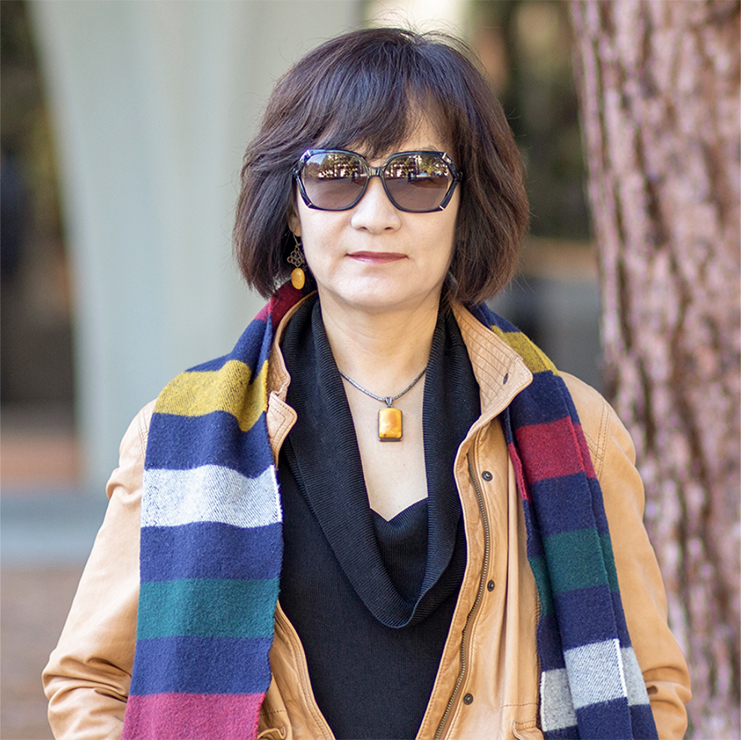Robotics Ethics
Jeeloo Liu, Ph.D., professor of Philosophy, named a Carnegie Fellow

Fellowship Will Fund Research on Robotics Ethics
Philosophy professor JeeLoo Liu has joined a rare group of social science and humanities scholars and writers. April 23, the Cal State Fullerton chair of philosophy was named a 2019 Andrew Carnegie Fellow. The fellowship funds humanities and social sciences research.
Even more rare: she is the only one of this year’s 32 fellows chosen for a project that focuses on philosophy.
Nicknamed “the brainy awards,” the national fellowship provides up to $200,000 to support an academic leave for the fellows to focus on their studies. The criteria for the selection includes “high-caliber scholarship that applies fresh perspectives to some of the most pressing issues of our times.”
Liu’s proposal, “Confucian Robotic Ethics,” falls into the category of Technical and Cultural Creativity — Potential and Perils, one of this year’s four topic areas.
“I am very honored to be chosen among these other scholars,” she said. “I hope that my work will set the path for future collaborations among robot designers and ethicists.”
Lui teaches philosophy of mind on a regular basis, and has always been interested in learning about the nature of our mind by contrasting it with artificial intelligence. She wanted to find a topic that would enhance the exchange between science and humanities, and decided to work on robotic ethics because she believes that having humanoid robots in our society is a real possibility. "We need to prepare for the future and think carefully about how to design robots that would one day make decisions based on the ethical codes we build into them. Establishing ethical dimensions of technology needs to precede technological advancements, not as an afterthought for remedy."
Lui has published two books on Chinese philosophy — “An Introduction to Chinese Philosophy: From Ancient Philosophy to Chinese Buddhism,” and “Neo-Confucianism: Metaphysics, Mind, and Morality.” She served as co-editor of “Consciousness and Self” and “Nothingness in Asian Philosophy.”
Liu’s latest research focuses on robotics ethics, the subject of a conference paper she presented last year in Hong Kong and Macau. She plans to use her two-year leave to continue her research and develop her findings into a book.
“I need to learn from artificial intelligence designers about the feasibility of designing ethical codes into the machine’s functionality,” she stated in her proposal. “With the advancement of AI (artificial intelligence) technology, the appearance of intelligent humanoid robots in our society is very likely in the foreseeable future,” she said. “Whether they truly possess human intelligence and can think like humans is up to philosophical debate, but they will surely entice their human interlocutors to be inclined to treat them as humans and to interact with them as members of the human society."
“Intelligent robots will one day become members of our society, sharing our jobs, taking care of our elderly, serving us at restaurants and hotels, making important navigational, military and even medical decisions for us."
“For the sake of expediency, these machines will soon be designed with the ability to make decisions on their own,” Liu explains. “Should we equip these robots with a moral code to teach them right from wrong when we empower them to make their own decisions? If so, what kind of moral codes would be able to bring about the kind of artificial moral agents that we would like to have in our society?”
Liu studies these questions from a perspective of Confucian ethics, because it aims to build a harmonious community.
Confucian ethics has proven to be a successful ethical model for maintaining a thriving and interconnected human society in Asian culture. She hopes to construct concrete principles to be designed into artificial agents.
Liu has frequently ventured into new topics in her research, and has introduced new courses at CSUF, such as philosophy of language, philosophy of time, meaning and mind, as well as senior seminars on consciousness, moral psychology, and moral sentimentalism.
Liu earned her master’s and a doctorate in philosophy at the University of Rochester. She also earned an M.A. degree in philosophy from National Taiwan University.
Advice for her students:
"Aim high and always learn new things to keep your mind active. It is not how you begin your career path, but what you will end up accomplishing in the long run that matters."
All additional photos in Spark page are decorative background images.
Photo credits: Human robot by Franck V, unsplash. Drone by Jared Brashier, unsplash. Child with robot by Andy Kelly, unsplash. Background Confusian antiquity by Peter Albrecht, CC BY-NC-SA 2.0. All Modified.
